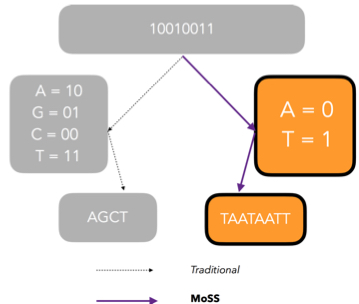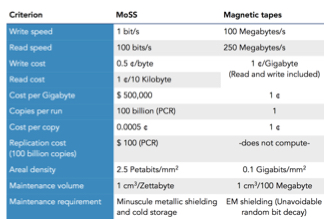Irish Start-Up Helixworks Just Discovered
With molecular storage system storing data in DNA
This is a Press Release edited by StorageNewsletter.com on January 6, 2017 at 4:42 pmMoSS (Molecular Storage System) is an open architecture to store digital information in DNA (Deoxyribonucleic acid).
DNA is ubiquitous to life and all most all living organisms contain this molecule and has thought to exist on earth for more than 3.5 billion years.
DNA is known for its robust and resilient nature and its efficiency in carrying genetic information from generation to generation. MoSS takes advantage of these chemical properties of DNA and use it for storing digital data.
Synthesising long fragments of DNA has been an expensive endeavour and one of the primary issuing in adopting DNA as a main stream storage medium.
MoSS is cost efficient compared to previous researches and brings down the cost of DNA to $0.005/byte.
It is compatible with existing robotic pipette handling platforms and the process of synthesising MoSS fragments is end-to-end automated. The user can embed any binary information in DNA with zero hands-on time.
Using MoSS platforms, digital data can be archived in DNA at enterprise. MoSS is a dense medium with areal data density of 2.5PB/mm², which leads all other storage media by a margin.
Integration of cost effectiveness along with ready to deploy automation strategy, MoSS is the beginning of a new epoch in storage technologies.
Helixworks Technologies is the developer of MoSS, and is in a continuous pursuit to democratise DNA.
Tech Insight
Storing information in DNA was a research endeavour since several decades and most of the conducted previous research has focussed on utilising the 4 bases in DNA – Adenine, Guanine, Cytosine and Thymine (A,G, C and T) to be used as a base-4 numeral system and compress as much as data possible into it by algorithms.
MoSS shatters this approach by using only 2 bases in DNA for storage (A and T for data), the other 2 bases are used for extension and stabilising DNA (G and C for stability).
A visualisation of traditional approach versus MoSS
for representing a binary number
MoSS is relaxed on compression and is true-to-binary format. The strategy of using only two bases (A and T for storage) brings down the number of combinations to a base-2 system. This leads to a smaller number of overall possible combinations and operational blocks.
Guanine and Cytosine rich regions would exist at the terminals of MoSS blocks that aid in maintaining stability and help in extension of MoSS fragments.
MoSS (DNA) vs Competition
A tabular comparison between MoSS versus traditional data archival medium is shown below. MoSS is the first DNA data archival platform developed by Helixworks to bring DNA as a front runner in data archival medium at an enterprise.
As emphasised in the above table, the read and write speeds are relatively extremely slow with regards to MoSS which would likely improve with time. MoSS shines in being robust and easily replicable with low cost. The maintenance cost of MoSS is low as it would require refrigeration and shielding in the range of cubic millimetres.
MoSS would also bring down the sequencing cost as it uses a binary approach for storage and sequencing of only the bit-bases (A and T) would reveal all the encoded information.
As an open source system, the MoSS platform moves forward by the collective efforts of its partners working hand-in-hand to cater the industry requirements.
MoSS would be standardised along the traditional data archival medium with planned revisions published via openmoss.org. The MoSS platform is open for all to use, replicate, modify and reproduce for non-commercial/research purposes. Any commercial endeavours by a third-party (non MoSS partners) originating or evolved from the MoSS platform should be notified to the MoSS partners prior to commercialisation.
MoSS founder and C3 partner (Chemistry, Community & Commercialisation) – Helixworks Technologies, Ireland.
MoSS hardware partner – OpenTrons, USA













 Subscribe to our free daily newsletter
Subscribe to our free daily newsletter
